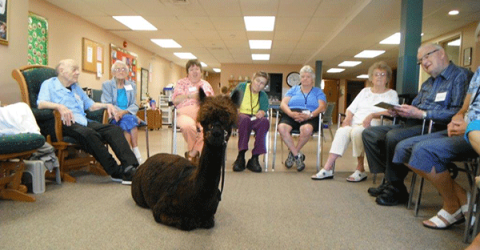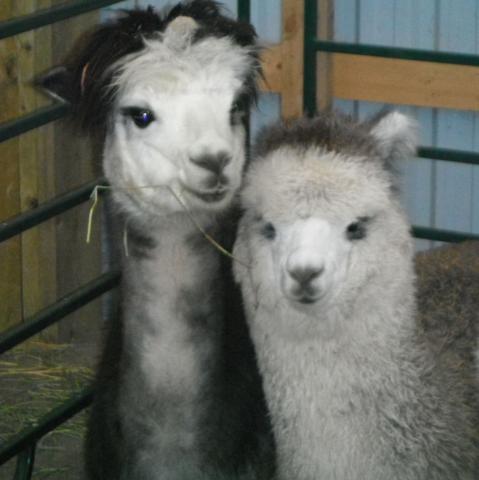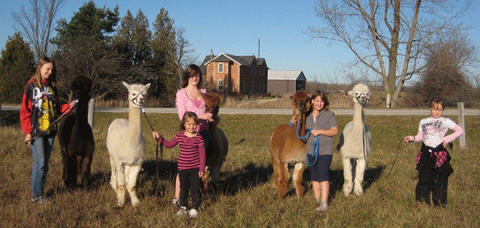
If they know what’s good for them, dogs had better watch their backs. There’s a new pet therapy animal in the mix that’s every bit as cute and cuddly as those ubiquitous grinning golden retrievers. And they’ve got novelty on their side. Enter alpacas. Adorable, adorable alpacas.
Indigenous to South America, but finding champions as far north as Canada, the fuzzy, docile domesticated member of the camelid family looks like a small llama but is companionable to children and seniors, making them exceptionally appealing as therapy animals.
Alpacas are, in the words of Doug Lilleyman, co-owner with wife Carolyn Lilleyman of Markdale, Ontario’s Kickin’ Back Alpaca Ranch, “nature’s pacifists.
“I have never known an alpaca to bite anyone,” Lilleyman confirms to Samaritanmag with a chuckle. “If you do something they don’t like, they’ll just walk away. If you were to grab an alpaca, it would struggle to get away from you but the moment it was free, it would just walk away. It would never attack.”
Though the Lilleyman’s business is breeding and selling alpacas, they are deeply committed to charitable and educational outreach, wanting to share the joy that alpacas brought to their lives when they discovered them by coincidence two-plus decades ago.

In fact, alpacas proved even more satisfying to the Lilleymans than running the resort. “By 2008 we’d had alpacas for a year and decided to go all the way,” selling the resort and buying another farm, despite having no previous experience raising animals. “It really was a heck of a life change,” Doug Lilleyman says.
Today, Kickin’ Back Alpaca Ranch typically has between 60 and 75 animals. Of those, four or five are “really good at being handled. And we’ll have as many as two dozen that we’ll take out to farmer’s markets where they’re more for display. We usually take females. They seem a little calmer.”
The charitable pet therapy component is especially satisfying.In a typical year, Lilleyman reckons Kickin’ Back does “about two to three education events for children that are organized by local school boards and those are fairly set. Seniors are more when someone contacts us and wants to bring folks here [the barn is wheelchair accessible] or have us bring an animal to them. That might happen three to six times a year.”
“First I would like to emphasize that neither Carolyn or myself are trained therapists," Lilleyman says. "The following comments are just our opinions from years of observations and feedback from people we have worked with. We take one or two well behaved alpacas out for visits and we allow the people to get up close and watch them, to pet them. Many of the people we visit are retired farmers so they appreciate a larger animal coming for a visit.
"One of the groups we work with is a group home for troubled teens. A couple of teens come over to the farm once a week for a few hours to work on the farm doing chores and then work with the alpacas. We stress to them that they must be calm and relaxed if they want the alpacas to interact with them. The councillors report the kids are much calmer and more focused after spending time the alpacas.
"When working with seniors we often hear that some of them that never get involved in other activities will get involved when they find out that alpacas will be there, it can be the first step for becoming active again. The feedback again is very positive, we are told that after the visit everyone is in a much better frame of mind. With the seniors we often just let the alpaca wonder around from one person to the other."
Alpacas aren’t just fun to interact with and profitable to breed. They’re multi-purpose, too. “We take the fibre from the animals and we actually have it made into yarn. We then hire local knitters to knit for us and turn that into hats, mitts, scarves and that sort of stuff, which we sell at farmer’s markets and craft shows.
“We also do educational events at the Royal Agricultural Winter Fair and the International Plowing Match and Rural Expo. We usually take a couple of alpacas to these events so people can actually see and touch them and learn more about them.”
And alpaca farming is flourishing in Canada. Lilleyman estimates there are “several hundred” alpaca farms nationwide, albeit some more as hobby farms than full-time enterprises. Still, one thing is certain: alpacas — adorable, adorable alpacas — are here to stay.
“Like any animal, each has its own personality,” Lilleyman says of his charges. “Alpacas are generally on the shy side but also curious, which makes for an interesting combination.
“Some alpacas are more outgoing. They don’t mind people and will stand there and be petted and hugged. Those are the kind of animals we use for pet therapy.”
Rover, take heed.
